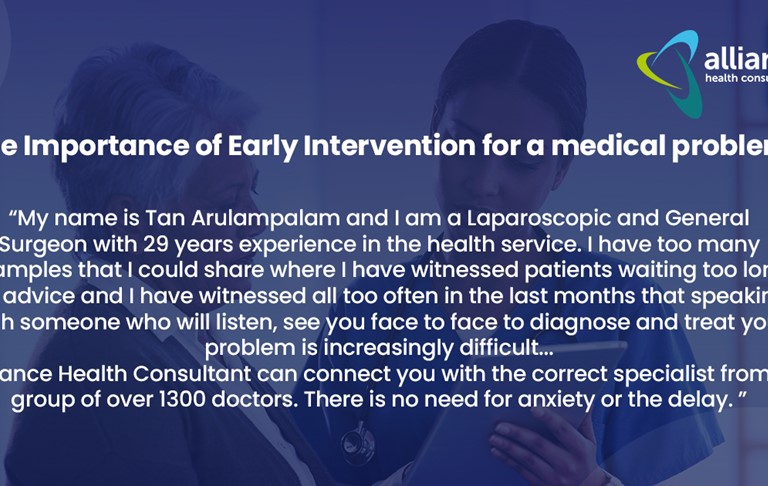The Importance of Early Interventation for a Medical Problem
My name is Tan Arulampalam and I am a Laparoscopic and General Surgeon with 29 years experience in the health service. Having qualified at St. Bartholomew’s Hospital in London, I have spent many years working within both the NHS and private sector in the UK.
We are enormously lucky in our profession not only to serve but to have an understanding about disease and quality of life. Most people will seek medical advice due to pain or fear. Medical services have been so disrupted during the pandemic that the access to high quality trusted advice has been severely affected. To me it is so vitally important that if one has a medical complaint, that one seeks trusted medical advice as soon as possible. When people are suffering with a medical problem they may, at first, ignore it and try to carry on with their normal day to day life. The problem will always be there, even if, just at the back of the mind. Once the problem has been there for long enough, people tend to talk to a trusted friend or partner. They may even look to Google for a possible diagnosis of the problem. This in itself causes additional anxiety. One of the disadvantages of online searches is that they will bring up millions of different pages based on your search criteria. Curating, understanding and putting the information into context and then ensuring that one draws the correct conclusions is challenging if not impossible. What it very rarely does, if at all, is put the person in front of a trusted medical specialist with expertise in the relevant field. Someone who can listen, diagnose and empathetically navigate the complex management pathways that make modern medicine so successful for some.
My advice to anyone with a concern, however small, is to seek professional advice. In the first instance that would be a GP. In these challenging times that can be very difficult. Quicker access to a medical specialist will often give a better chance for the medical specialist to diagnose the problem sooner and put the patient on a road to recovery a lot quicker. The reassurance if nothing is wrong is as important as intervening, supporting and ultimately giving the patient a faster recovery from the issue.
I have too many examples that I could share where I have witnessed patients waiting too long for advice, but also where patients have thankfully acted very quickly in obtaining advice. I will share with you briefly an example of both situations of either waiting too long as well as acting quickly. It will bring to life the importance of seeking medical advice quickly.
Waiting too long:
A lady in her 60s sought help from her GP for tiredness and difficulty sleeping. Due to the pandemic, she could not get an appointment without holding on the phone for hours. She eventually gave up and left things a while. She had some mild change in her bowel habit and finally managed to get through to the surgery. She spoke to a nurse who recommended treating the symptoms with anti diarrhoeal medication. Some months later, the lady developed chest pain and when she presented in the Emergency department she was found to have angina (lack of oxygen to the heart that causes pain) due to anaemia. Anaemia is a red flag finding. Because she had not been seen by her GP she had not had her blood tests. Why was she anaemic? IT turned out that after a series of tests, she had a bowel cancer that had caused slow blood loss and the change in bowel habit. These are all subtle symptoms that really needed attention. Unfortunately, the bowel cancer was now advanced which made treatment more difficult with a smaller chance of eradicating the disease and effecting a cure.
A Good Outcome
A 55 year old man felt a lump in his groin. He thought that things were certainly not right. HE could not get an appointment to see his GP so he got in touch with his local private hospital and saw the consultant surgeon the next day. He was reassured that the lump was not a tumour. The ump was a groin hernia and as the man ran his own scaffolding business was about to choose the time of his treatment so that there was no impact on his work and therefore his income. He made a good recovery and had a very simple and straightforward health journey.
We all have good and bad stories, but the common theme, and one that I have witnessed all too often in the last few months, is that speaking to someone who will listen, see you face to face and diagnose and treat your problem is increasingly difficult. I am constantly contacted by friends and friends of friends for advice. It inevitably results in me connecting them with the correct health professional. We can all access this benefit through Alliance Health Consultant who can connect you with the correct specialist from a group of over 1300 doctors. There is no need for the anxiety or the delay.

